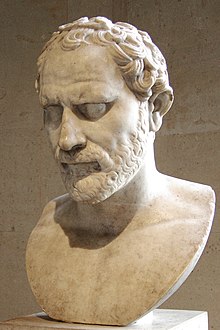Demosthenes
Appearance


Demosthenes (Δημοσθένης) (384 BC – 322 BC) was a prominent Greek statesman and orator of ancient Athens, generally considered the greatest of the Greek orators.
Quotes
[edit]- ὥσπερ γὰρ οἰκίας, οἶμαι, καὶ πλοίου καὶ τῶν ἄλλων τῶν τοιούτων τὰ κάτωθεν ἰσχυρότατ᾽ εἶναι δεῖ, οὕτω καὶ τῶν πράξεων τὰς ἀρχὰς καὶ τὰς ὑποθέσεις ἀληθεῖς καὶ δικαίας εἶναι προσήκει
- For a house, I take it, or a ship or anything of that sort must have its chief strength in its substructure; and so too in affairs of state the principles and the foundations must be truth and justice.
- Olytnhiac II, 10 [1]
- For a house, I take it, or a ship or anything of that sort must have its chief strength in its substructure; and so too in affairs of state the principles and the foundations must be truth and justice.
- The easiest thing in the world is self-deceit; for every man believes what he wishes, though the reality is often different.
- Third Olynthiac, section 19 (349 BC), as translated by Charles Rann Kennedy (1852)
- Variants:
- A man is his own easiest dupe, for what he wishes to be true he generally believes to be true.
- As quoted in The Routledge Dictionary of Quotations (1987) by Robert Andrews, p. 255
- There is nothing easier than self-delusion. Since what man desires, is the first thing he believes.
- Delivery, delivery, delivery.
- Response when asked to name the three most important components of rhetoric, as quoted in Institutio Oratoria (c. 95) by Quintilian; also in Unspoken : A Rhetoric of Silence (2004) by Cheryl Glenn, p. 150
- The readiest and surest way to get rid of censure, is to correct ourselves.
- As quoted in The World's Laconics: Or, The Best Thoughts of the Best Authors (1853) by Everard Berkeley, p. 34
- It is not possible to found a lasting power upon injustice, perjury, and treachery.
- Reported in Josiah Hotchkiss Gilbert, Dictionary of Burning Words of Brilliant Writers (1895), p. 455.
- No man can tell what the future may bring forth, and small opportunities are often the beginning of great enterprises.
- Ad Leptinem 162, as quoted in Dictionary of Quotations (Classical) (1897) by Thomas Benfield Harbottle, p. 511[2]
- The man who has received a benefit ought always to remember it, but he who has granted it ought to forget the fact at once.
- As quoted in Dictionary of foreign phrases and classical quotations (1908) by Hugh Percy Jones, p. 140
- Every advantage in the past is judged in the light of the final issue.
- Olynthiacs; Philippics (1930) as translated by James Herbert Vince, p. 11
- Whatever shall be to the advantage of all, may that prevail!
- Speech against Philip II of Macedon (351 BC), in Olynthiacs; Philippics (1930) as translated by James Herbert Vince, p. 99
- You cannot have a proud and chivalrous spirit if your conduct is mean and paltry; for whatever a man's actions are, such must be his spirit.
- As quoted in Journal of the History of Ideas Vol. 1 (1940), p. 472
Quotes about Demosthenes
[edit]- Of orators, if I must choose you any, it shall be Demosthenes, both for the argument he handles, and for that his eloquence is more proper to a statesman than Cicero's.
- Francis Bacon, Advice to Fulke Greville on his studies, quoted in The Oxford Authors: Francis Bacon, ed. Brian Vickers (1996), p. 105
- Do you remember that in classical times when Cicero had finished speaking, the people said, "How well he spoke" but when Demosthenes had finished speaking, they said, "Let us march."
- Adlai Stevenson, introducing John F. Kennedy in 1960, as quoted in Adlai Stevenson and The World: The Life of Adlai E. Stevenson (1977) by John Bartlow Martin, p. 549
External links
[edit]- Works by Demosthenes at Project Gutenberg
- "Demosthenes" by Plutarch
- Perseus Encyclopedia
- Ancient Library
- Britannica, 11th Edition
- Britannica online
- Biography and links
- Center for Hellenic Studies
- Columbia Encyclopedia, Sixth Edition (2001–05)
- "Demosthenes" by Ron Kurtus
- "Demosthenes" by Jona Lendering
- "Philip, Demosthenes, and Alexander" by Sanderson Beck
- "The Assembly during Demosthenes' era" by Christopher W. Blackwell
- A Smaller History of Ancient Greece-Philip of Macedon by William Smith
- "Hypotheses to the Orations of Demosthenes" by Libanius
- Statues of Demosthenes



